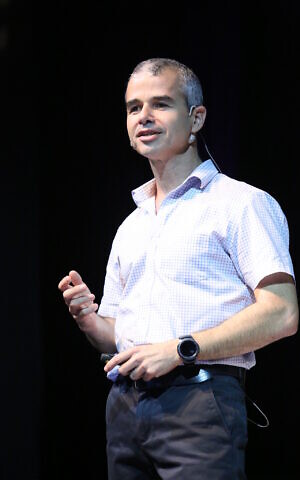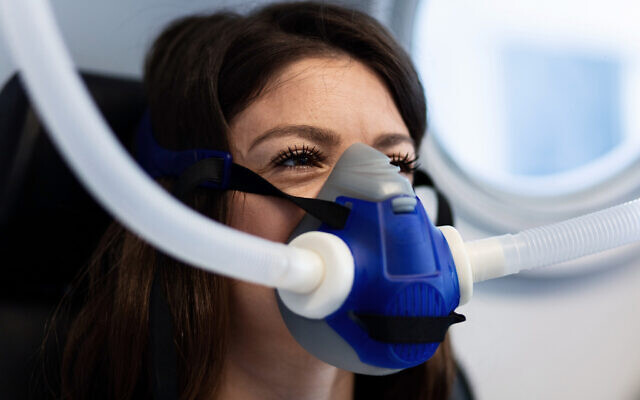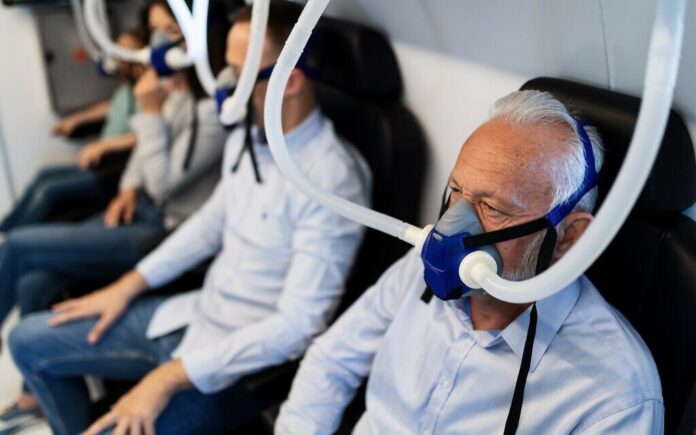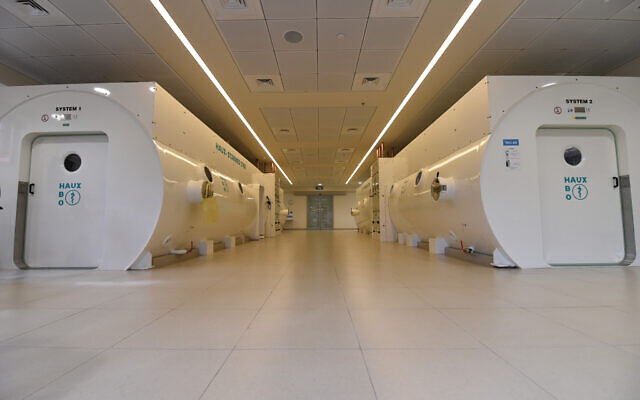An Israeli doctor says he has figured out how to “reverse” aging in the brain and has tried it successfully on volunteers. The answer, he says, has been right in front of our noses this whole time — oxygen.
Shai Efrati claims he has found that when healthy adults aged 65-plus were given a special oxygen therapy, their cognitive function improved and so did the brain’s tissue function.
“It reverses aging,” said Efrati, a Tel Aviv University associate professor and a senior doctor at the Shamir Medical Center in Tzrifin near Rishon Lezion. “It improves cognitive function, and doesn’t just slow its decline.”
Get The Start-Up Israel’s Daily Start-Up by email and never miss our top stories
Free Sign Up
“This is the first time, from what I know, that there is biological intervention that improves the biology of the brain in the normal aging population. The decline that comes with aging doesn’t need to be taken as given,” Efrati told The Times of Israel.
Hyperbaric chambers at the Sagol Center for Hyperbaric Medicine and Research at Shamir Medical Center (courtesy of Sagol Center)
One of the volunteers from his experiment, Avi Rabinovitch, 69, said that he “entered this study healthy, and left it a tiger,” adding that his memory and cognition have improved.
Efrati recruited 63 people aged 65-plus, took MRI scans and tested their cognitive abilities. He then gave some of them a 60-day course of treatment during which they spent 2-hour stints in a pressurized chamber five times a week, breathing pure oxygen for some of the time.

Professor Shai Efrati of the Sagol Center for Hyperbaric Medicine and Research at Shamir Medical Center (courtesy of the Sagol Center)
At the end of the experiment, those who didn’t go in the hyperbaric chamber had similar MRI results as they did at the start, and similar cognitive ability. But Efrati reported a significant difference on those who received the oxygen therapy — and found the improvements held in tests six months later.
“In these people, MRI scans showed that tissue function in the brain, in areas associated with cognitive decline, had improved, and we also found a significant improvement in cognitive function,” he said, stressing that staff carrying out the assessments didn’t know which patients had received the therapy.
Efrati’s study was published Wednesday, after peer-review, in the journal Aging. A company he co-founded, Aviv Scientific, has been developing oxygen therapy programs for healthy adults and working on marketing, since 2017, and started offering sessions privately in America last month. Aviv has a clinic in Florida, and plans to open another in Dubai by the end of the year.
Norm O’Rourke, an expert on the mental health of seniors who is unconnected to the research, told The Times of Israel he thinks the study is “compelling.”
O’Rourke, professor at Ben Gurion University’s School of Public Health, praised the fact that results used two separate parameters, cognitive ability and results of brain MRI scans. O’Rourke said: “It’s very interesting because not only did they do the neurocognitive tests, they also have physiological data on brain blood flow, so the two sets of findings corroborate each other.”
He added: “The sample size isn’t huge but for a first study that’s not necessarily problematic.”
Hillel Aviezer, a professor of psychology at the Hebrew University of Jerusalem, who was not involved in the study, commented: “This is an interesting study with some preliminary promising outcomes. However, there is still room for caution in interpreting the results. Specifically, the control group did not undergo any intervention while the hyperbaric oxygen therapy (HBOT) group experienced a highly intense protocol of meetings for multiple days a week, across several months.
“The HBOT group’s weekly structured meetings, social interactions with the testers, and natural placebo effects may have all contributed to the improved attention and processing speed found in the results. Still, the study provides a nice step forward and will hopefully trigger future work with more tightly controlled double-blind experimental designs.”

Patient wearing a mask while having hyperbaric oxygen therapy (iStock)
The idea of delivering pure oxygen as a therapy isn’t new, and hyperbaric chambers can be found around the world to treat conditions including decompression sickness, air embolisms, and thermal burns.
The US Food and Drug Administration has cleared the therapy for these three conditions and 10 others, but urges people to handle claims of other uses with caution, and also warns that use of the chambers can carry risks of joint pain and even paralysis. It raised concerns that hyperbaric therapy has been “touted” as a “universal treatment.”
Efrati is director of one of the world’s largest hyperbaric medicine centers, Shamir’s Sagol Center for Hyperbaric Medicine and Research, which treats more than 200 patients daily.
He said that the healthy adults in his study were given oxygen in the chamber according to a stop-start schedule developed to treat patients in his Israel-based clinic suffering from wounds, burns and other conditions.
Efrati said that this protocol generates significant fluctuations in blood oxygen, and suggested that the intermittent increasing of oxygen concentration induces many of the mediators and cellular mechanisms needed for regeneration. He said this means that the fluctuation of oxygen induces a regenerative mechanism that is usually induced during hypoxia, a lack of oxygen. But his therapy protocol “fools” the body into a state of hypoxia without it being hazardous.
He decided to try this protocol on healthy adults because, as people age, blood vessels carry less oxygen to the brain, and he thinks that hyperbaric treatment compensates for this.
“The occlusion of small blood vessels, similar to the occlusions which may develop in the pipes of an ‘aging’ home, is a dominant element in the human aging process,” he said. “This led us to speculate that hyperbaric oxygen therapy may affect brain performance of the aging population.”







